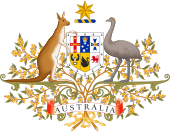| Australian Citizenship Act 2007 | |
|---|---|
 | |
| Parliament of Australia | |
| |
| Citation | No. 20 of 2007 |
| Royal assent | 15 March 2007 |
| Commenced | 1 July 2007 |
| Administered by | Department of Home Affairs[1] |
| Legislative history | |
| Introduced by | John Cobb |
| First reading | 9 November 2005 |
| Second reading | 28 November 2006 |
| Third reading | 28 November 2006 |
| Passed | 1 March 2007 (agreed to Senate amendments) |
| Member(s) in charge | Ian Campbell |
| First reading | 30 November 2006 |
| Second reading | 26 February 2007 |
| Third reading | 26 February 2007[2] |
| Repeals | |
| Australian Citizenship Act 1948 | |
| Status: Amended | |
Australian nationality law details the conditions by which a person is a national of Australia. The primary law governing nationality regulations is the Australian Citizenship Act 2007, which came into force on 1 July 2007 and is applicable in all states and territories of Australia.
All persons born in Australia before 20 August 1986 were automatically citizens at birth regardless of the nationalities of their parents. Individuals born in the country after that date receive Australian citizenship at birth if at least one of their parents is an Australian citizen or permanent resident. Children born in Australia to New Zealand citizens since 1 July 2022 also receive Australian citizenship at birth. Foreign nationals may be granted citizenship after living in the country for at least four years, holding permanent residency for one year, and showing proficiency in the English language.
Australia is composed of several former British colonies founded in the 18th and 19th centuries whose residents were British subjects. After federation as a Dominion within the British Empire in 1901, Australia was granted more autonomy over time and gradually became independent from the United Kingdom. Although Australian citizens have no longer been British subjects since 1984, they continue to hold favoured status when residing in the UK. As Commonwealth citizens, Australians are eligible to vote in UK elections and serve in public office there.
- ^ The Administration of the Immigration and Citizenship Programs (PDF) (Report). Department of Home Affairs. October 2021. p. 3. Archived (PDF) from the original on 25 October 2021. Retrieved 25 October 2021.
- ^ "Australian Citizenship Bill 2007". Parliament of Australia. Archived from the original on 27 May 2019. Retrieved 13 June 2019.